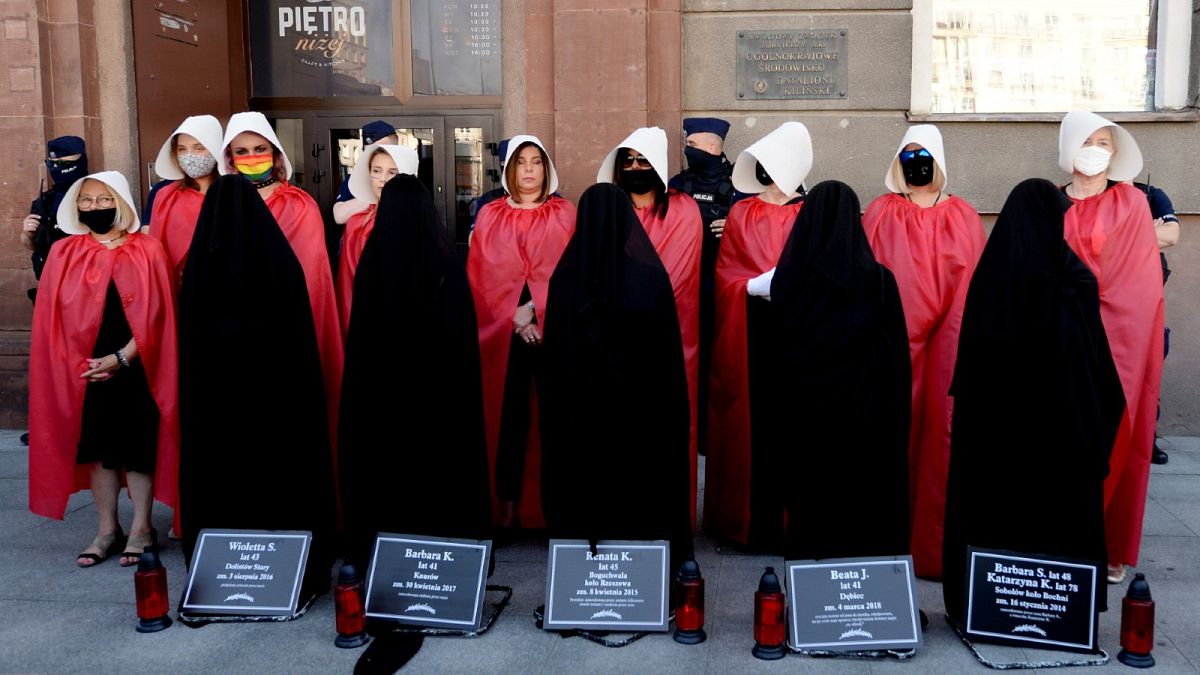Poland's plan to leave the domestic violence treaty has put it back in the headlines. But what is the Istanbul Convention?
Turkish President Recep Tayyip Erdogan's decision to abandon a treaty on combating violence against women has brought outrage across Europe.
This is the latest example but it's not completely isolated. Several countries have expressed their wish to leave the Istanbul Convention - the first legally binding instrument that establishes a set of legal rules to combat violence against women.
But what is the Istanbul Convention and has it truly made a difference so far?
Who established the Istanbul Convention and why?
The original name of the Istanbul Convention is the “Council of Europe Convention on preventing and combating violence against women and domestic violence”. Since that name is quite a mouthful, it is mostly referred to as the Istanbul Convention, where it was first opened for signatures on 11 May 2011.
The Council of Europe had already started several initiatives to promote the protection of women against violence since the 1990s. Over the years and across the span of several campaigns it became increasingly clear that there was a need for a set of legal standards to ensure that victims anywhere could benefit from the same level of protection.
In 2008, the Committee of Ministers of Justice of the Council of Europe set up an expert group mandated to draft up a convention that would set the standards to prevent and combat violence against women and domestic violence.
The final draft was ready two years later, in 2010. But before it was finished several countries had tried to soften the language and take out certain paragraphs, much to the dismay of human right organisations, such as Amnesty International.
On 11 May 2011, the convention was opened for signatures in Istanbul, Turkey. As of today, 12 countries have signed the convention without ratifying it, and 34 countries who have signed, ratified the convention and enforced it. It came into force on 1 August 2014.
Who hasn’t signed it and who hasn’t ratified it?
Turkey was the first country to ratify the convention on 12 March 2012. Followed by 33 other countries. In 2017, the EU finally signed as well.
Several countries have signed the convention but never ratified it, meaning it was never enforced. Those countries include Armenia, Bulgaria, Czech Republic, Hungary, Latvia, Liechtenstein, Lithuania, Republic of Moldova, Ukraine and the UK.
A few others refused to sign the convention in the first place, such as Russia and Azerbaijan.
What does the Istanbul Convention say and what does it not say?
The Istanbul Convention is the first-ever legally binding set of guidelines that creates “a comprehensive legal framework and approach to combat violence against women” and is focused on preventing domestic violence, protecting victims, and prosecuting accused offenders.
It also states that violence against women is a violation of human rights and a form of discrimination.
The Convention does outline which acts must be criminalised by the participating countries. Such offences include psychological violence, stalking, physical violence, sexual violence (including rape), all non-consensual acts of a sexual nature with a person, forced marriage, female genital mutilation, forced abortion, and forced sterilisation, honour crimes as well as sexual harassment.
An independent group of experts titled GREVIO (i.e. Group of Experts on Action against Violence against Women and Domestic Violence) was tasked with monitoring the implementation of the convention.
There have been a few items of contention, which have sparked criticism from potential and current signees. One of the major points of criticism is that the Convention does define the term “gender” as “the socially constructed roles, behaviours, activities, and attributes that a given society considers appropriate for women and men”.
Some countries considered this definition as too broad and feared it could be interpreted to make way for the allowance of a third gender. However, according to the Convention gender and sex are two separate concepts and the definition does not intend to replace the terms for "women" and "men".
There is no explicit mention of the terms "intersex" and "transgender" within the Istanbul Convention. The parties are, however, required to avoid any discrimination based on someone’s gender or sexual identity, as well as their race, colour, language, religion, political or other opinions, national or social origin, association with a national minority, property, birth, age, state of health, disability, marital status, migrant or refugee status.
Another aspect some countries are hesitant to oblige by is that the Istanbul Convention requires parties to include teaching material on non-stereotyped gender roles. This is on occasion regarded as an attempt to enforce a liberal, western lifestyle in more traditional and conservative societies - as they perceive themselves.
Does the Istanbul Convention have an actual impact?
According to the Parliamentary Assembly of the European Council (PACE), the Istanbul Convention has already had a tangible impact, as higher legislative and policy standards have been introduced in national law in several countries, and it has raised awareness among victims and society in general.
in some countries, such as Montenegro, the convention has had a positive effect on the legislature that protects women, a report noted. However, there is room for improvement, according to the OSCE (Office for Democratic Institutions and Human Rights) report.
PACE also noted that the Istanbul Convention helped raise awareness of domestic violence and helped educate victims. It also stimulated debate on the issue, the parliamentarians said.


